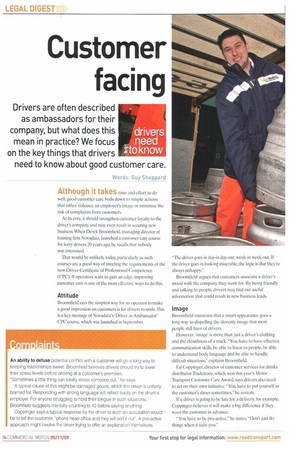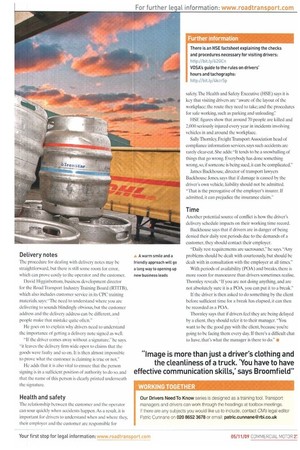Customer facing
Page 26

Page 27

If you've noticed an error in this article please click here to report it so we can fix it.
Drivers are often described as ambassadors for their company, but what does this mean in practice? We focus on the key things that drivers need to know about good customer care.
drivers need ;to know
Words: Guy Sheppard
Although it takes time and effort to do well, good customer care boils down to simple actions that either enhance an employer's image or minimise the risk of complaints from customers.
At its core, it should strengthen customer loyalty to the driver's company and may even result in securing new business. When Derek Broomfield, managing director of training firm Novadata, launched a customer care course for lorry drivers 20 years ago, he recalls that nobody was interested.
That would be unlikely today, particularly as such courses arc a good way of meeting the requirements of the new Driver Certificate of Professional Competence (CPC). If operators want to gain an edge, improving customer care is one of the most effective ways to do this
Attitude
Broomfield says the simplest way for an operator to make a good impression on customers is for drivers to smile. This is a key message of Novadata's 'Driver as Ambassador' CPC course, which was launched in September.
"The driver goes in day-in day-out, week-in week-out. If the driver goes in looking miserable, the logic is that they're always unhappy."
Broomfield argues that customers associate a driver's mood with the company they work for. By being friendly and talking to people, drivers may find out useful information that could result in new business leads.
Image
Broomfield maintains that a smart appearance goes a long way to dispelling the slovenly image that most people still have of drivers.
However, 'image' is more than just a driver's clothing and the cleanliness of a truck. -You have to have effective communication skills, be able to listen to people, be able to understand body language and be able to handle difficult situations," explains Broomfield.
Ed Coppinger, director of customer services for drinks distributor Tradeteam, which won this year's Motor Transport Customer Care Award, says drivers also need to act on their own initiative. "You have to put yourself in the customer's shoes sometimes," he reveals.
If a driver is going to be late for a delivery, for example, Coppinger believes it will make a big difference if they warn the customer in advance.
"You have to be pro-active," he states. -Don't just do things when it suits you."
Delivery notes
The procedure for dealing with delivery notes may be straightforward, but there is still some room for error, which can prove costly to the operator and the customer.
David Higginbottom, business development director for the Road Transport Industry Training Board (RTITB), which also includes customer service in its CPC training materials, says: "The need to understand where you are delivering to sounds blindingly obvious, but the customer address and the delivery address can be different, and people make that mistake quite often."
He goes on to explain why drivers need to understand the importance of getting a delivery note signed as well.
"If the driver comes away without a signature," he says, "it leaves the delivery firm wide open to claims that the goods were faulty and so on. It is then almost impossible to prove what the customer is claiming is true or not."
He adds that it is also vital to ensure that the person signing is in a sufficient position of authority to do so, and that the name of this person is clearly printed underneath the signature.
Health and safety
The relationship between the customer and the operator can sour quickly when accidents happen. As a result, it is important for drivers to understand when and where they, their employer and the customer are responsible for safety. The Health and Safety Executive (HSE) says it is key that visiting drivers are "aware of the layout of the workplace; the route they need to take; and the procedures for safe working, such as parking and unloading': HSE figures show that around 70 people are killed and 2,000 seriously injured every year in incidents involving vehicles in and around the workplace.
Sally Thomley, Freight Transport Association head of compliance information services, says such accidents are rarely clear-cut. She adds: "It tends to be a snowballing of things that go wrong. Everybody has done something wrong, so, if someone is being sued, it can be complicated."
James Backhouse, director of transport lawyers Backhouse Jones, says that if damage is caused by the driver's own vehicle, liability should not be admitted, "That is the prerogative of the employer's insurer. If admitted, it can prejudice the insurance claim."
Time
Another potential source of conflict is how the driver's delivery schedule impacts on their working time record.
Backhouse says that if drivers are in danger of being denied their daily rest periods due to the demands of a customer, they should contact their employer.
"Daily rest requirements are sacrosanct," he says."Any
A warm smile and a problems should be dealt with courteously, but should be friendly approach wilt go dealt with in consultation with the employer at all times."
a long way to opening up With periods of availability (POA) and breaks, there is new business leads more room for manoeuvre than drivers sometimes realise,
Thornley reveals. "If you are not doing anything, and are not absolutely sure it is a POA, you can put it to a break."
If the driver is then asked to do something by the client before sufficient time for a break has elapsed, it can then be recorded as a POA.
Thorn Icy says that if drivers feel they are being delayed by a client, they should refer it to their manager. "You want to be the good guy with the client, because you're going to be facing them every day. If there's a difficult chat to have, that's what the manager is there to do." •
















































































































































